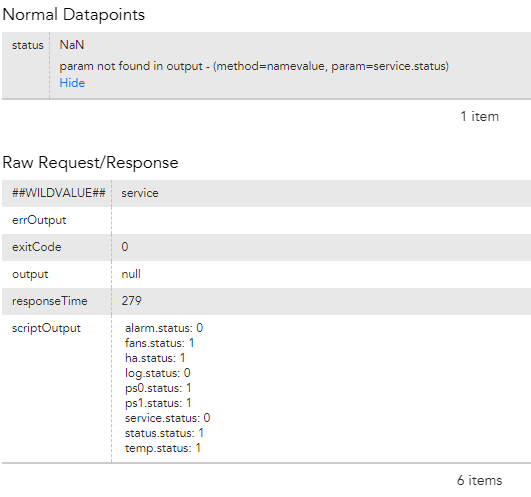 Neophyte
NeophytePalo Alto XML Response Help
- 12 months ago
Ok, this piqued my interest so i tried throwing it against one of my palos. I’m not groovy enough to understand how to work with that response object. Instead, I chose the quick/dirty route of converting to a string and parsing from there. I also now better understand the data, so I retract my original advise of making this single instance and advise instead to make it multi-instance with one instance for each LED (this may have been what you originally meant and I totally misunderstood).
Anyway, here’s the discovery script that’s now working in my environment (again, I didn’t do this the groovy way):
Updated/working script here: https://github.com/sweenig/lm/tree/main/Palo%20Chassis%20LEDs
def host = hostProps.get("system.hostname")
def port = hostProps.get("paloalto.port")?: 443
def apikey = hostProps.get("paloalto.apikey.pass")?.trim()
if (apikey == null) {println("No paloalto.apikey.pass set");return 1}
def response
def command = URLEncoder.encode("<show><system><state><filter>chassis.leds</filter></state></system></show>", "UTF-8")
def url = "https://${host}:$port/api/?type=op&key=${apikey}&cmd=${command}"
def getRequestConn = url.toURL().openConnection()
if (getRequestConn.responseCode == 200) {
body = getRequestConn.content.text
response = new XmlSlurper().parseText(body)
data = response.toString()
data.tokenize("{,}").each{
kv = it.tokenize(":")
if ((it.trim() != "chassis.leds:") && (kv.size() > 1)){
wildvalue = kv[0].replaceAll('\'','')
println("${wildvalue}##${wildvalue}")
}
}
return 0
} else {return 2}Here’s the collection script:
def host = hostProps.get("system.hostname")
def port = hostProps.get("paloalto.port")?: 443
def apikey = hostProps.get("paloalto.apikey.pass")?.trim()
if (apikey == null) {println("No paloalto.apikey.pass set");return 1}
status_map = [
"Off": 0,
"Green": 1,
"AnotherColor": 2,
"YetAnother": 3,
"AndAnother": 4
]
def response
def command = URLEncoder.encode("<show><system><state><filter>chassis.leds</filter></state></system></show>", "UTF-8")
def url = "https://${host}:$port/api/?type=op&key=${apikey}&cmd=${command}"
def getRequestConn = url.toURL().openConnection()
if (getRequestConn.responseCode == 200) {
body = getRequestConn.content.text
response = new XmlSlurper().parseText(body)
data = response.toString()
data.tokenize("{,}").each{
kv = it.tokenize(":")
if ((it.trim() != "chassis.leds:") && (kv.size() > 1)){
println("${kv[0].replaceAll('\'','')}.status: ${status_map[kv[1].trim()]}")
}
}
return 0
} else {return 2}And the datapoint looks like this:
multi-line key-value pairs: ##WILDVALUE##.status
For some reason (maybe new bug in v186) the script output has the right content but LM’s not picking it up:

service.status is definitely in the output, so i’m befuddled. Support chat here I come.